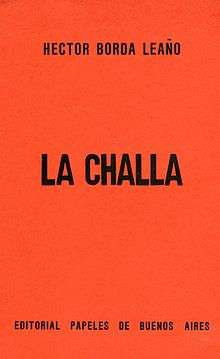Hector Borda Leaño
Héctor Borda Leaño (born 1927, Oruro), is a Bolivian politician, anthropologist and poet. He was born into an intellectual family of landowner gentry from Sucre and joined the Falange Socialista Boliviana (FSB), a radical right wing party, as a teenager in the early 1940s. Eventually he was elected for this party to the national congress 1966-1969. In the early 1970s he broke out from the FSB together with Marcelo Quiroga Santa Cruz and Walter Vasquez Michel and turned left wing. After the military coup led by Hugo Banzer in 1971 Borda was forced into exile, first to Argentina and again in 1977 to Sweden. He returned to Bolivia in 1982 as elected senator for the newly formed Partido Socialista (PS-1).[1]

During the 1960s Borda Leaño was a founding member of the cultural movement Prisma, which gathered the Bolivian intellectual elite. Its leading members, among them Pedro Shimose, Julio de La Vega and monsignor Juan Quiróz, were closely connected to the newspaper El Diario and were key in extending Bolivian literary influence across its national borders.[2]
Borda Leaño is the author of several poemaries and was twice awarded the Franz Tamayo national award for his books La Challa (1965) and Con Rabiosa Alegría (1970). In 2010 he was awarded with the Bolivian national cultural award "Marina Núñez del Prado" by the ministry of culture of the Bolivian plurinational state.[3]
Works
- 1965 La Ch'alla. Buenos Aires: Editorial Papeles de Buenos Aires.
- 1966 El sapo y la serpiente. Oruro: Universidad técnica de Oruro.
- 1970 Con rabiosa alegría. La Paz: Municipalidad de La Paz.
- 1972 En esta oscura tierra, with original engravings by Ricardo Carpani. Buenos Aires: Ediciones Dead Weight/Editorial Losada.
- 1997 Poemas desbandados. La Paz: Plural editores.
- 1998 Las claves del comandante. La Paz: Plural editores.
- 2013 Poemas para una mujer de noviembre. Tromsø: Series de E-poesías "Mariposa".
References
|